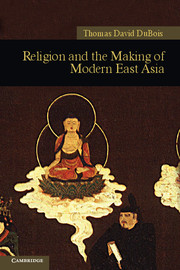Book contents
- Frontmatter
- Contents
- List of Boxes, Figures, and Maps
- Preface
- 1 In the beginning: Religion and history
- 2 Ming China: The fourteenth century's new world order
- 3 The Buddha and the shōgun in sixteenth-century Japan
- 4 Opportunities lost: The failure of Christianity, 1550–1750
- 5 Buddhism: Incarnations and reincarnations
- 6 Apocalypse now
- 7 Out of the twilight: Religion and the late nineteenth century
- 8 Into the abyss: Religion and the road to disaster during the early twentieth century
- 9 Brave new world: Religion in the reinvention of postwar Asia
- 10 The globalization of Asian religion
- Glossary
- Timeline of dynasties and major events
- Suggestions for further reading
- Index
8 - Into the abyss: Religion and the road to disaster during the early twentieth century
Published online by Cambridge University Press: 05 June 2012
- Frontmatter
- Contents
- List of Boxes, Figures, and Maps
- Preface
- 1 In the beginning: Religion and history
- 2 Ming China: The fourteenth century's new world order
- 3 The Buddha and the shōgun in sixteenth-century Japan
- 4 Opportunities lost: The failure of Christianity, 1550–1750
- 5 Buddhism: Incarnations and reincarnations
- 6 Apocalypse now
- 7 Out of the twilight: Religion and the late nineteenth century
- 8 Into the abyss: Religion and the road to disaster during the early twentieth century
- 9 Brave new world: Religion in the reinvention of postwar Asia
- 10 The globalization of Asian religion
- Glossary
- Timeline of dynasties and major events
- Suggestions for further reading
- Index
Summary
Toward Confucian fascism: China searches for direction
One frozen Beijing morning early in 1898, a Confucian scholar named Kang Youwei (1858–1927) sat somewhere in the maze of antechambers of the Forbidden City, waiting for an audience with the young Guangxu (1871–1908) emperor. For Kang, an improbably youthful forty years old, this was a once in a lifetime honor, albeit one that would eventually end with his fleeing the country and the emperor a prisoner within his own palace. It occurred at a particularly momentous time. China had just lost a disastrous war with Japan, defeated by a country that nearly all had considered a laughably insignificant foe and losing its traditional sovereignty over the Korean Peninsula in the bargain. It would not be long before Beijing itself was overrun, first by the Boxers, and soon afterward by foreign troops. But for a brief moment, the meeting of minds between Kang and the Chinese emperor offered a glimpse of a radically different future.
Kang himself had led something of charmed and sheltered life. Like many of the political reformers who would follow him, Kang was a Cantonese, originally from the distant South, thousands of miles from the political intrigues in Beijing. As a child, he had displayed all the signs of becoming a promising scholar and was groomed from an early age to take the Confucian civil service exams.
- Type
- Chapter
- Information
- Religion and the Making of Modern East Asia , pp. 161 - 193Publisher: Cambridge University PressPrint publication year: 2011



